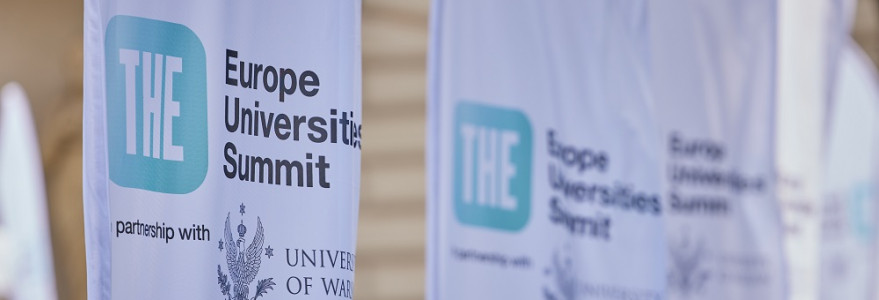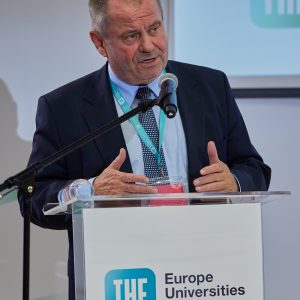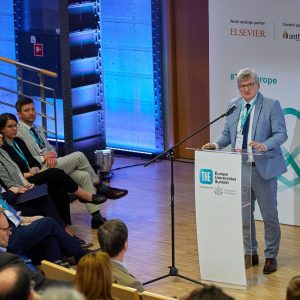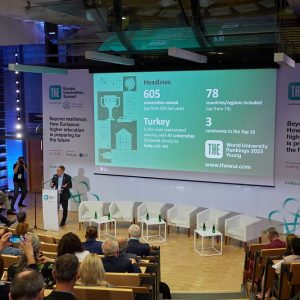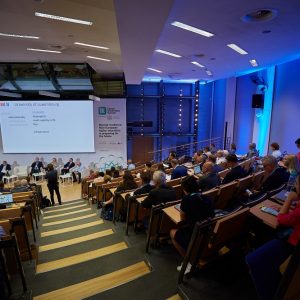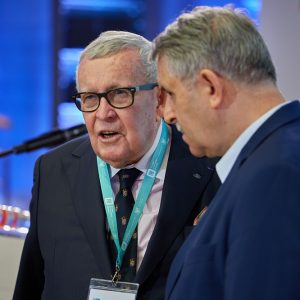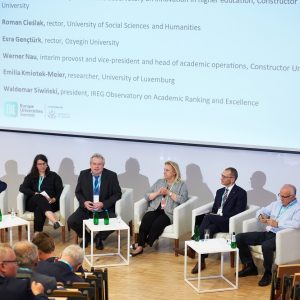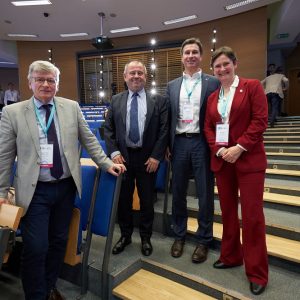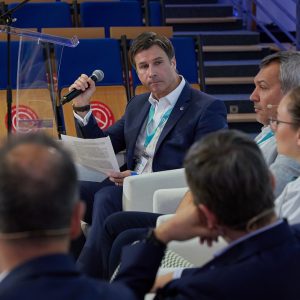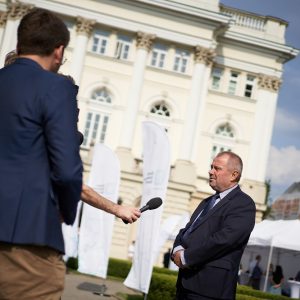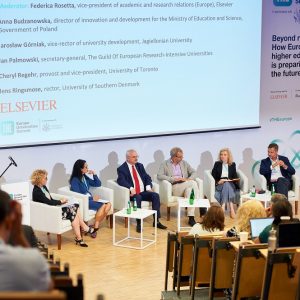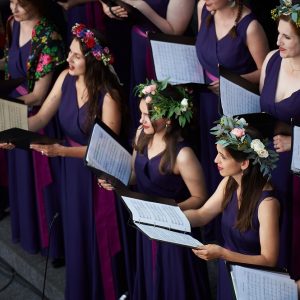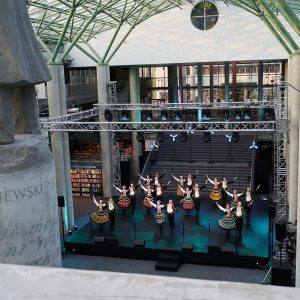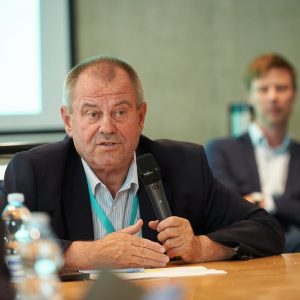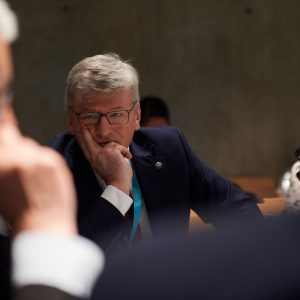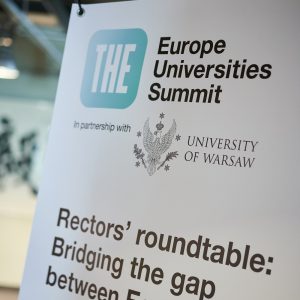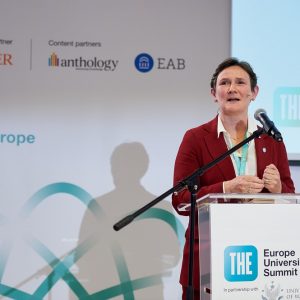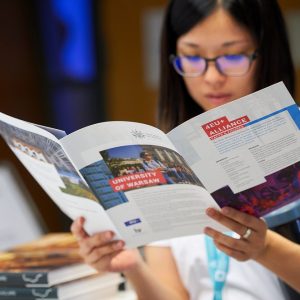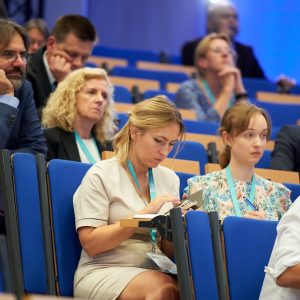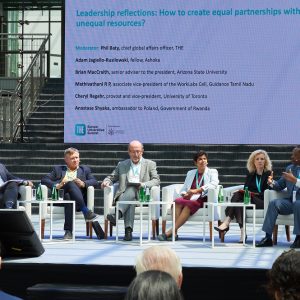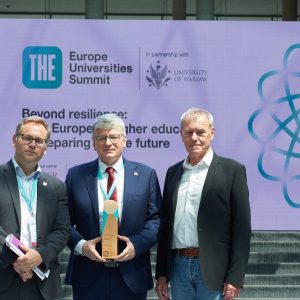Rankings motivate universities to reach higher positions and achieve better results. As a research university we plan to collaborate with institutions from Europe and the rest of the world. The university should be a place of developing new competences, sharing experiences and opinions,” Prof. Alojzy Z. Nowak, the UW Rector, said during the THE Europe Universities Summit, co-organised by the UW.
On 3rd – 5th July, the University of Warsaw and Times Higher Education organised an international conference “Beyond resilience: How European higher education is preparing for the future”.
During the THE Europe Universities Summit, its participants focused on how universities and other higher education institutions continue to play a crucial role in the recovery, unification and progression of societies across Europe and beyond.
Rankings and motivation
The participants of the event were welcomed by Prof. Alojzy Z. Nowak, the UW Rector. “Rankings motivate universities to reach higher positions and achieve better results. As a research university we plan to collaborate with institutions from Europe and the rest of the world. The university should be a place of developing new competences, sharing experiences and opinions. Today the University of Warsaw hosts an event which facilitates conversations and debates between scientists, universities and the socio-economic environment,” the UW Rector said.
“This gathering of prominent administrators, policy makers and politicians is a new ingredient in our University’s operations. The event aligns well with our strategic goals to turn the University of Warsaw into a modern, research university,” Prof. Zygmunt Lalak, the UW Vice-Rector for Research, said at the opening of the conference.
Internationalisation and multidisciplinary
On the first day of the summit, the results of the THE Young University Rankings 2023 were announced, which was followed by a discussion about the role of young universities in Europe. The strategic goals of such universities were presented by their representatives from Turkey, Luxembourg, Germany and Poland. “Luxembourg was one of the countries which did not have its own university. Once the university was founded in 2003, it was important to attract international students. For this purpose, the university had to find a niche. It was decided to formulate three principles guiding the university: internationality, multilingualism and interdisciplinarity,” Dr Emilia Kmiotek-Meier from the University of Luxembourg said in her speech.
The challenges of young universities were addressed also by Prof. Werner Nau, the Interim Provost, Vice President and Head of Academic Operations at Constructor University in Bremen. “We constantly have to reconsider our priorities. English as a language of education was a good selling point twenty years ago. There is a need to move away from monodisciplinary programmes and build very attractive curriculum structures, which are different from the classic ones,” Prof. Nau said.
The collaboration with Ukrainian universities was put forward on the second day of the summit during the panel on the Twinning Initiative. The programme facilitates building partnerships between Ukrainian and British universities.
“Our participation in the Twinning Imitative is special, because due to the war, the Kherson State University’s community is currently displaced. As part of the initiative, we found really a great partner, the University of Kent. We focused together, e.g. on education of our academics. Kherson State University has a very good history department. We conducted joint projects and organised roundtables with our partner university, raising such topics as the history of Ukraine,” said Prof. Alla Tsipov, the Vice–Rector for International, Social and Humanitarian Issues of Kherson State University.
Human and machine face challenges
As part of the second day of the summit, a debate on artificial intelligence and innovative technological tools was organised. It was attended by Robert Grey, the UW Chancellor, and Gabriela Allmi, the Senior Director EMEA and Asia Pacific at Harvard Business Publishing Education.
“The University of Warsaw puts an emphasis on digitalisation on various levels. The University should be open for various innovations, such as ChatGPT. Applying artificial intelligence is undoubtedly an achievement, but we should remember that the final decision is made by people and the machine only facilitates this process,” the Chancellor Grey emphasised.
“When you are facing a global challenge as we did with the pandemic, the society, especially in Britain, remembered who you turn to. You turn to your great universities with their research background and their ability to have the creativity and ideas to meet that challenge,” Prof. Irene Tracey, the Vice-Chancellor of the University of Oxford, said during her speech on research cooperation between Oxford scientists and AstraZeneca.
Rectors’ roundtables
One of the key sessions of the conference was the rectors’ roundtable held at the last day of the summit. Together with rectors of national and international universities, Prof. Alojzy Z. Nowak, the Rector of the University of Warsaw, was discussing collaborative work of European institutions to position Europe as a leading and competitive zone within the global higher education context.
“The university rankings unfortunately confirm that there is a gap between Eastern and Western Europe. We have been also observing it in the research as most grants go to the Western universities,” Prof. Alojzy Z. Nowak, the UW Rector, said during the panel.
The session was also attended by Nargiz Gurbanova, the Ambassador of Azerbaijan to Poland, which shared her view on university education. “The fact that we really have to pursue the life-long learning is a must, not only for universities, but also societies and economies,” the ambassador said.
The “Vice-president of research roundtable” was another session organised on the third day of the conference. The discussion was centred around cooperation between universities in regard to research development and innovation.
“We would like to strengthen our scientific output, with international relations being an important factor in enhancing the University of Warsaw’s visibility. We can see that the collaboration between individual research teams is also steadily growing,” Prof. Lalak, the UW Vice-Rector for Research, underlined. The participants of the panel, such as Prof. Renata Papp, the Director of Centre of Science & Innovations at Semmelweis University (Hungary), also pointed out that innovation should not be seen as something detached from the fundamental research.
The Times Higher Education conference was concluded by Prof. Lalak’s address. “It has been a historic event, because the summit was organised for the first time in this part of Europe. I hope it is going to have a long-lasting impact on the ways in which we shall think about higher education. It has been an amazing experience to hear all these voices at roundtable discussions and lectures,” the UW Vice-Rector for Research said.
The Europe Universities Summit was a chance to discuss the challenges related to the climate crisis, the military invasion in Ukraine, economic instability and the continued aftermath of the serious health crisis caused by COVID-19. The participants of the event agreed that these issues require the joint actions stemming from higher education institutions, as the centre of education, research and innovation.
The details about the event are available at: https://www.timeshighered-events.com/europe-universities-summit-2023



